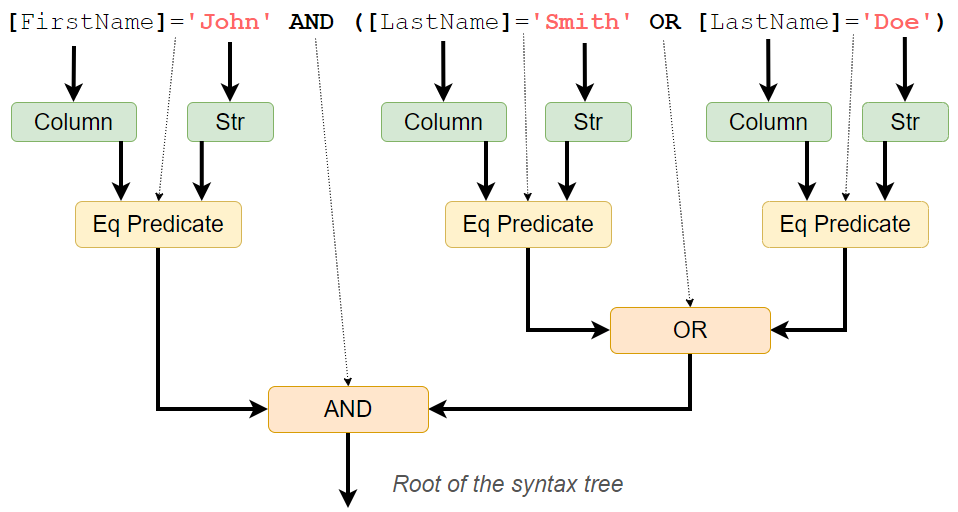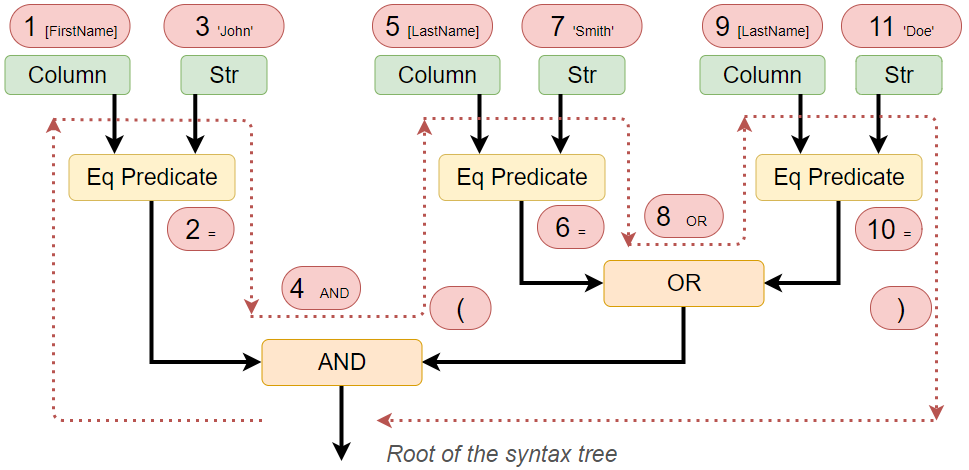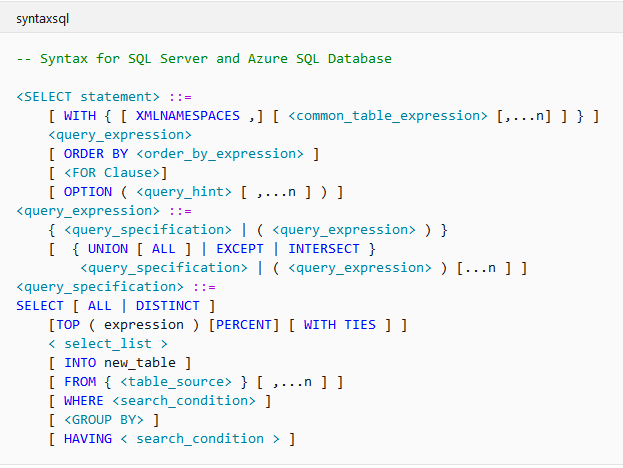
Dans cet article, en utilisant l'exemple d'expressions logiques simples, il sera montré ce qu'est un arbre de syntaxe abstraite et ce que vous pouvez en faire. Une alternative aux expressions LINQ pour exécuter des requêtes sur des bases de données SQL sera également envisagée.
L'histoire du développeur
C'était un projet Legacy et on m'a demandé d'améliorer ses capacités de filtrage "avancées".
Ils avaient quelque chose comme ça:

Et ils voulaient quelque chose comme ça:

, «» :
CREATE PROCEDURE dbo.SomeContextUserFind
(@ContextId int, @Filter nvarchar(max)) AS
BEGIN
DECLARE @sql nvarchar(max) =
N'SELECT U.UserId, U.FirstName, U.LastName
FROM [User] U
INNER JOIN [SomeContext] [C]
ON ....
WHERE [C].ContextId = @p1 AND ' + @Filter;
EXEC sp_executesql
@sql,
N'@p1 int',
@p1=@ContextId
END, , :
string BuildFilter(IEnumerable<FilterItem> items)
{
var builder = new StringBuilder();
foreach (var item in items)
{
builder.Append(item.Field);
bool isLike = false;
switch (item.Operation)
{
case Operation.Equals:
builder.Append(" = ");
break;
case Operation.Like:
isLike = true;
builder.Append(" LIKE ");
break;
//...
}
builder.Append('\'');
if (isLike)
builder.Append('%');
builder.Append(Escape(item.Value));
if (isLike)
builder.Append('%');
builder.Append('\'');
}
return builder.ToString();
}, , - , , , ( ) . , , , - .
, , — «FilterItem» , , , .
« », , , , , .
-, , , :
[FirstName]='John' AND ([LastName]='Smith' OR [LastName]='Doe'):

, , , :

abstract class Expr
{ }
class ExprColumn : Expr
{
public string Name;
}
class ExprStr : Expr
{
public string Value;
}
abstract class ExprBoolean : Expr
{ }
class ExprEqPredicate : ExprBoolean
{
public ExprColumn Column;
public ExprStr Value;
}
class ExprAnd : ExprBoolean
{
public ExprBoolean Left;
public ExprBoolean Right;
}
class ExprOr : ExprBoolean
{
public ExprBoolean Left;
public ExprBoolean Right;
}, , :
var filterExpression = new ExprAnd
{
Left = new ExprEqPredicate
{
Column = new ExprColumn
{
Name = "FirstName"
},
Value = new ExprStr
{
Value = "John"
}
},
Right = new ExprOr
{
Left = new ExprEqPredicate
{
Column = new ExprColumn
{
Name = "LastName"
},
Value = new ExprStr
{
Value = "Smith"
}
},
Right = new ExprEqPredicate
{
Column = new ExprColumn
{
Name = "LastName"
},
Value = new ExprStr
{
Value = "Doe"
}
}
}
};, , « », , «», .
« » — ( ) ( ) . . , ( ) :
<eqPredicate> ::= <column> = <str>
<or> ::= <eqPredicate>|or|<and> OR <eqPredicate>|or|<and>
<and> ::= <eqPredicate>|(<or>)|<and> AND <eqPredicate>|(<or>)|<and>: «» , , , , . .
— , , , , .
SQL
, , .
— (Pattern Matching), :
var filterExpression = ...;
StringBuilder stringBuilder = new StringBuilder();
Match(filterExpression);
void Match(Expr expr)
{
switch (expr)
{
case ExprColumn col:
stringBuilder.Append('[' + Escape(col.Name, ']') + ']');
break;
case ExprStr str:
stringBuilder.Append('\'' + Escape(str.Value, '\'') + '\'');
break;
case ExprEqPredicate predicate:
Match(predicate.Column);
stringBuilder.Append('=');
Match(predicate.Value);
break;
case ExprOr or:
Match(or.Left);
stringBuilder.Append(" OR ");
Match(or.Right);
break;
case ExprAnd and:
ParenthesisForOr(and.Left);
stringBuilder.Append(" AND ");
ParenthesisForOr(and.Right);
break;
}
}
void ParenthesisForOr(ExprBoolean expr)
{
if (expr is ExprOr)
{
stringBuilder.Append('(');
Match(expr);
stringBuilder.Append(')');
}
else
{
Match(expr);
}
}:
[FirstName]='John' AND ([LastName]='Smith' OR [LastName]='Joe'), !
""
, - — « (Visitor)». , , ( ), , . :
interface IExprVisitor
{
void VisitColumn(ExprColumn column);
void VisitStr(ExprStr str);
void VisitEqPredicate(ExprEqPredicate eqPredicate);
void VisitOr(ExprOr or);
void VisitAnd(ExprAnd and);
}( ) :
abstract class Expr
{
public abstract void Accept(IExprVisitor visitor);
}
class ExprColumn : Expr
{
public string Name;
public override void Accept(IExprVisitor visitor)
=> visitor.VisitColumn(this);
}
class ExprStr : Expr
{
public string Value;
public override void Accept(IExprVisitor visitor)
=> visitor.VisitStr(this);
}
...sql :
class SqlBuilder : IExprVisitor
{
private readonly StringBuilder _stringBuilder
= new StringBuilder();
public string GetResult()
=> this._stringBuilder.ToString();
public void VisitColumn(ExprColumn column)
{
this._stringBuilder
.Append('[' + Escape(column.Name, ']') + ']');
}
public void VisitStr(ExprStr str)
{
this._stringBuilder
.Append('\'' + Escape(str.Value, '\'') + '\'');
}
public void VisitEqPredicate(ExprEqPredicate eqPredicate)
{
eqPredicate.Column.Accept(this);
this._stringBuilder.Append('=');
eqPredicate.Value.Accept(this);
}
public void VisitAnd(ExprAnd and)
{
and.Left.Accept(this);
this._stringBuilder.Append(" AND ");
and.Right.Accept(this);
}
public void VisitOr(ExprOr or)
{
ParenthesisForOr(or.Left);
this._stringBuilder.Append(" OR ");
ParenthesisForOr(or.Right);
}
void ParenthesisForOr(ExprBoolean expr)
{
if (expr is ExprOr)
{
this._stringBuilder.Append('(');
expr.Accept(this);
this._stringBuilder.Append(')');
}
else
{
expr.Accept(this);
}
}
private static string Escape(string str, char ch)
{
...
}
}:
var filterExpression = BuildFilter();
var sqlBuilder = new SqlBuilder();
filterExpression.Accept(sqlBuilder);
string sql = sqlBuilder.GetResult();:
[FirstName]='John' AND ([LastName]='Smith' OR [LastName]='Joe')" (Visitor)" . , , , IExprVisitor , , ( ).
, .
-, ?
, , sql :

, , .
-, ?
, . «» , «» — . , . ( ), .
, , “NotEqual”, () , :
class ExprNotEqPredicate : ExprBoolean
{
public ExprColumn Column;
public ExprStr Value;
public override void Accept(IExprVisitor visitor)
=> visitor.VisitNotEqPredicate(this);
}, , SQL:
public void VisitNotEqPredicate(ExprNotEqPredicate exprNotEqPredicate)
{
exprNotEqPredicate.Column.Accept(this);
this._stringBuilder.Append("!=");
exprNotEqPredicate.Value.Accept(this);
}, , MS SQL , , , .
, SQL Server SQL, :

, . C#. :
class ExprColumn : Expr
{
...
public static ExprBoolean operator==(ExprColumn column, string value)
=> new ExprEqPredicate
{
Column = column, Value = new ExprStr {Value = value}
};
public static ExprBoolean operator !=(ExprColumn column, string value)
=> new ExprNotEqPredicate
{
Column = column, Value = new ExprStr {Value = value}
};
}
abstract class ExprBoolean : Expr
{
public static ExprBoolean operator &(ExprBoolean left, ExprBoolean right)
=> new ExprAnd{Left = left, Right = right};
public static ExprBoolean operator |(ExprBoolean left, ExprBoolean right)
=> new ExprOr { Left = left, Right = right };
}:
ExprColumn firstName = new ExprColumn{Name = "FirstName"};
ExprColumn lastName = new ExprColumn{Name = "LastName"};
var expr = firstName == "John" & (lastName == "Smith" | lastName == "Doe");
var builder = new SqlBuilder();
expr.Accept(builder);
var sql = builder.GetResult();:
[FirstName]='John' AND ([LastName]='Smith' OR [LastName]='Doe'): C# && ||, , , ( true || ....), ( SQL).
, , ? - - (View Derived Table) ( ) .
! SQL SELECT:

, , (, ), , SQL.
LINQ
, , LINQ, . C# , , Entity Framework «LINQ to SQL», SQL.
, C#, SQL! C# SQL – , .
— C# SQL. , .
, , , . , , intellisense - . … , LEFT JOIN LINQ)
, (INSERT, UPDATE, DELETE MERGE) , .
Juste un exemple de ce qui peut être fait en utilisant la vraie syntaxe SQL comme base ( tirée d'ici ):
await InsertInto(tCustomer, tCustomer.UserId)
.From(
Select(tUser.UserId)
.From(tUser)
.Where(!Exists(
SelectOne()
.From(tSubCustomer)
.Where(tSubCustomer.UserId == tUser.UserId))))
.Exec(database);Conclusion
L'arbre de syntaxe est une structure de données très puissante que vous rencontrerez probablement tôt ou tard. Peut-être que ce sera des expressions LINQ, ou peut-être que vous devez créer un analyseur Roslyn, ou peut-être que vous voulez créer votre propre syntaxe vous-même, comme je l'ai fait il y a quelques années, pour refactoriser un projet hérité. Dans tous les cas, il est important de comprendre cette structure et de pouvoir travailler avec elle.
Le lien vers SqExpress est un projet qui inclut partiellement le code de cet article.